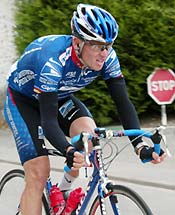Armstrong's publicity
machine rolls on
Francois Thomazeau
There were 189 riders at the start of the Tour de France a week ago, but for the 2,000 journalists covering the race there is only one story that really counts -- the star of the biggest cycling show on earth, Lance Armstrong.
"Did you talk to Lance today?" is one of the most frequently heard questions in the press centre. The answer is almost invariably no.
Not that the American despises the media; quite the opposite. But, as his U.S. Postal team spokesman Don Osipow puts it: "If Lance accepted all the interview requests, he would be forced to talk until midnight every day."
A professional, both on the road and behind a microphone, Armstrong considers handling the press an important part of his race strategy.
Journalists who belong to "the chosen few" and approach him regularly feel he is the one dictating the rules, both in the peloton and in terms of public relations.
"He's the one who decides when he wants to talk, who he talks to and what he says," said Jean-Pierre Bidet, the 'Armstrong specialist' for L'Equipe , the French sports daily who organise the Tour.
 Armstrong's team director Johan Bruyneel admits the three-times Tour champion has a 'media plan' for the Tour, allowing him to placate the press while concentrating on his job.
Armstrong's team director Johan Bruyneel admits the three-times Tour champion has a 'media plan' for the Tour, allowing him to placate the press while concentrating on his job.
"The thing is to find the right balance and to never forget that the most important thing is the race," he said.
"That's why we need to work on everything that makes recuperation easier. Whether he should be giving an interview or not is something we discuss according to the situation of the race.
BODYGUARDS
Readily available to journalists and fans alike in 1999, the year he won his first Tour, Armstrong has been forced ever since to protect his privacy.
Every morning, reporters, photographers and fans flock around the U.S. Postal team bus hoping for a glimpse, a quote or an autograph from 'the boss'.
"It's true that the first year, we had nothing planned at all about handling the media and it was a bit of a mess," said Bruyneel. "We learnt little by little."
Now Armstrong is protected by a bodyguard -- even though Bruyneel insists security is no tighter this year than previously -- and a team of press officers ready to discuss tactics and deliver second hand quotes to the media.
For Armstrong, who has at times had tense relationships with journalists, especially when doping allegations were made, has a strong sense of his image.
"He does not read everything that's written about him, but he reads most of it," said Bruyneel.
"It's normal he should be interested in what people think about him," he added.
Some journalists close to the American said he often knew exactly who he was talking to when interviewed for the first time and what the interviewer has written about him in the past.
The outspoken, sometimes big-mouthed Texan of 1999 turned into a rather diffident and remote character the year after when press reports accused him of failing a dope test for corticoids.
SHUNNED NEWSPAPERS
Armstrong was cleared of any wrongdoing but became reluctant to talk to the French press, perhaps also because he felt some newspapers had wrongly reported his rivalry with Italian Marco Pantani that year. But he also used the press to send messages to Pantani and other rivals.
Despite speaking very decent French -- he lived for a long time near Nice -- he insisted on talking English to avoid misinterpretations.
He also shunned influential French newspapers like L'Equipe or Le Monde, who reported some of the allegations against him, most recently a dropped case about medical equipment found in a dustbin in a hotel where his team were staying on the 2000 Tour.
Things improved this year and Armstrong, perhaps feeling more relaxed with three Tour victories behind him, speaks French again and appears more cheerful.
"I was not the one who approached him first. He came to me," said L'Equipe's Bidet. "He realised he could not do without L'Equipe on a race like the Tour.
"And of course we need him too. We needed to restore a better relationship," he said.
Even though the American sometimes picks the journalists he would or would not talk to, sometimes in the same newspaper, he has never avoided tricky questions.
"He always answers, however embarrassing the question. He never tries to get away without replying," said Bidet.
In last year's Tour, the revelation in the Sunday Times that he was consulting controversial Italian doctor Michele Ferrari did not ease the tension with journalists on the Tour but he faced the press in a news conference.
"I think the bottom line is he just likes to be liked, especially here in France," said Bruyneel.
"He is very popular in this country and would like to give some of this popularity back to the French crowds," he added.